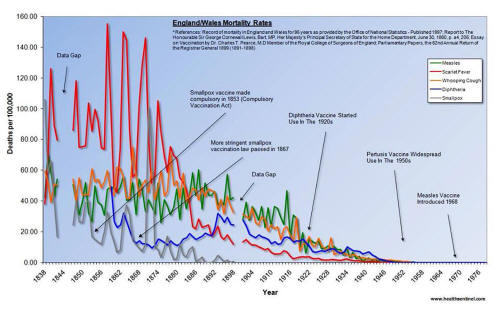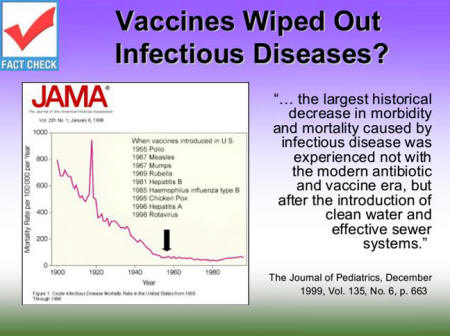|

by Joe Martino
September 29, 2015
from
Collective-Evolution Website
Spanish version

If you've been paying attention, you probably know that
vaccines
have been a huge topic of discussion for a long time now, and a very
emotional one as well.
But regardless of which side of the debate we
are on, our worries are well justified. We have seen many diseases
emerge over the course of human history that we want to protect
ourselves and our children from, and so we came up with ways to do
that.
The challenge is, our methods may have also increased our risk
for developing other diseases and health problems, and we need to
look at that side of the story.
Right off the top, we need to stop looking at it from a pro or anti
vaccine stance, relying on blind faith and emotion to support our
views. Both sides of the coin use propaganda to bash the other and
this actually reduces a very serious conversation to hate fuelled
and fact deficient bickering.
The media has also done a great job of
ensuring that questioning this topic is seen as sheer heresy to
begin with. But there are real concerns and very real information
backing those concerns to consider.
As a human race, we need to come together, drop all the arguments,
and simply figure things out for the betterment of all - not for
pharmaceutical gain, not because we're afraid to change (or because
we've 'always' done things this way), and not because we want to
prove the government or 'the man' was wrong.
We need to approach all
things openly like this, in the spirit of community and
collaboration.
One thing I've always wanted to do is create a space for scientists
to conduct unbiased research on this issue - to take 10 scientists
whose research shows that vaccines are safe and 10 scientists whose
research shows the opposite and get them in on an independently
funded study, working together.
This would ensure there is no
fudging of science, results, data or anything by either side to
produce desired results.
Education
People have been very misled about a lot of public health issues in
our world. This was made clear most recently when the Heart and
Stroke Foundation
released a new statement about heart health.
They claim (finally) that saturated fats
are actually not the problem, nor unhealthy, and it's more about a
well thought out diet than anything else.
The idea that saturated fats have been
vilified and are actually very important to brain health has been
going around for decades through people the mainstream considers
quacks, yet as is so often the case, these people were proven
correct a couple decades later when the mainstream finally caught
up.
I believe we need to keep these types of track records in mind when
we are presented with ideas that are new or alternative to what is
currently accepted.
We could start to slow the dissemination of poor
health information in the mainstream, the belief in which is
misleading people and causing them to lead less healthy lives.
Vaccine education is also very important.
There's plenty of
misinformation out there on both sides of the coin and it's causing
confusion among the masses. Part of this is a result of lack of
public knowledge, since it's often difficult to find good
information, and part of it is a result of the mainstream handing
out inaccurate information to shape and manipulate public opinion.
A great example of that is with common diseases, which people
believe vaccines eradicated completely. Yet in truth, they were
either wiped out naturally or eliminated by some other societal
upgrade.
Why is this important to know?
Because
the more we know about what is ACTUALLY going on, the better we can
stop responding to these issues emotionally and the clearer the
picture becomes for how to move forward.
Here is a graph from the Journal of Pediatrics that illustrates how
clean water and effective sewer systems caused the greatest
decreases in most infectious diseases, not vaccinations.

Here is another key link for future reading that looks at
vaccinations from an
honest point of view.
Check out the video below:
Here is a transcript of the video for those who cannot watch it.
Ty Bollinger:
But didn't vaccines wipe out
all the communicable diseases: the diphtheria, the pertussis,
the polio, weren't vaccines responsible for that?
Dr. Sherri Tenpenny (vaccine expert):
You know, it's interesting, because
every time someone is new to this topic it always starts from,
"Well, what about smallpox, what about polio?"
Well, I do an
hour and a half talk on that so I can maybe give you two
sentences that say the answer is no.
That less than 10 percent of the
global population was actually vaccinated for the smallpox
vaccine, and it was a virus that was dying out and becoming
weaker over time, and when we introduced hygiene and
refrigeration, that's when the smallpox started to go away.
And then, of course, it morphed into
this other type of virus called monkeypox, and so smallpox is
still around, it's just given a different name.
The same thing with polio.
The epidemic of polio in this
country was well on its way out before 1954 when FDR released
the polio vaccine. And we've seen nothing but travesty about
that ever since. And the only places in the world that still
report any polio are places that are using the oral polio
vaccine, which is a live virus.
The other thing is that polio is not a synonym for paralysis,
and that the vast majority of people don't understand that 98
percent of people who actually were exposed to the polio virus,
and maybe even contracted the infection [that] caused polio, it
was nothing more than looking like a stomach flu.
It was some diarrhea. It was maybe a
little bit of fever, and it just passed through that you maybe
thought you had food poisoning and then you had lifetime
immunity to this gastrointestinal virus.
But we have done such an amazingly good job impregnating
multi-generationally into people's brains about iron lungs and
little children with braces and people with deformed limbs.
That happened so infrequently in the
big picture, but yet we have this horrifying terror of polio
when we really shouldn't. I mean we've spent billions of dollars
around the world to eliminate that virus.
|



